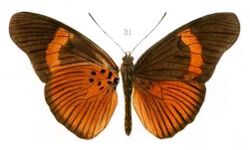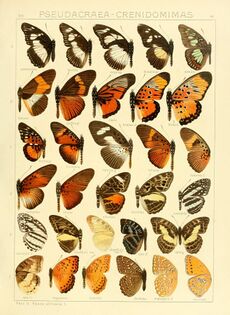Biology:Pseudacraea kuenowii
From HandWiki
Short description: Species of butterfly
| Kuenow's false acraea | |
|---|---|

| |
| Illustration of a male from the Ogooué River, tropical Africa | |
| Scientific classification | |
| Domain: | Eukaryota |
| Kingdom: | Animalia |
| Phylum: | Arthropoda |
| Class: | Insecta |
| Order: | Lepidoptera |
| Family: | Nymphalidae |
| Genus: | Pseudacraea |
| Species: | P. kuenowii
|
| Binomial name | |
| Pseudacraea kuenowii | |
| Synonyms | |
| |
Pseudacraea kuenowii, or Kuenow's false acraea, is a butterfly in the family Nymphalidae. It is found in Nigeria, Cameroon, Gabon, the Republic of the Congo, Angola, the Democratic Republic of the Congo, Kenya, Uganda and Zambia.[3]
Description
Ps. kuenowi strongly recalls Ps. hobleyi in the orange transverse band of the forewing and the white median hand of the hindwing, but has in the basal part of the forewing instead of the black dots a thick black longitudinal streak in the cell and in 1 b.
- kuenowi Dew. (46 b). The orange transverse band of the forewing of almost uniform breadth between the costal margin and vein 3, its spot in cellule 1 b much shorter than that in cellule 2; the white median band of the hindwing is narrow, with an almost uniform breadth of 5–6 mm., and only reaches vein 1 b, cellules 1 a and 1 b being light yellowish nearly to the base. Congo, rare; mimics Planema poggei (58 d).
- neumanni Thurau (= hypoxantha Jord.) only differs in having the orange median band of the forewing somewhat broader, distinctly wider at the costal margin than at vein 4, the spot in cellule 1 b as long as that in 2, while the white median band of the hindwing reaches the inner margin, towards which it is distinctly widened; the inner margin is only yellowish between the white band and the anal angle. Uganda. Ps. gottbergi Dew. (46 b) has on the forewing a narrow, somewhat curved transverse band of almost uniform breadth, which reaches the hindmargin near the hinder angle, is composed of nearly quadrate spots and has a spot also in the apex of the cell. The hindwing is dark red-brown with black streaks and narrow black marginal band. The forewing on both surfaces with a thick black longitudinal streak in the cell and in cellules 1 b and 2. This rare species is coloured and marked almost exactly like Ps. ruhama (46 c) and Planema elongata (58 b, c). Cameroons to the southern Congo region.[4]
Subspecies
- Pseudacraea kuenowii kuenowii — southern and eastern Democratic Republic of the Congo, Zambia
- Pseudacraea kuenowii burgessi Jackson, 1951 — Uganda: slopes of Mount Elgon, Kenya: slopes of Mount Elgon
- Pseudacraea kuenowii gottbergi Dewitz, 1884 — Nigeria, Cameroon, Gabon, Congo, Angola, western Democratic Republic of the Congo
- Pseudacraea kuenowii hypoxantha Jordan, 1911 — Uganda
- Pseudacraea kuenowii kigezi Jackson, 1956 — Uganda: west to the Kigezi and Ankole districts
Biology
The habitat consists of forests.
Adults mimic Acraea elongata.[citation needed]
References
| Wikimedia Commons has media related to Pseudacraea kuenowii. |
- ↑ Dewitz , H. 1879. Afrikanische Tagschmetterlinge. Nova Acta Academiae Caesarea Leopoldina-Carolinae Germanicum Naturae Curiousorum 41 (2): 173-212.
- ↑ "Pseudacraea Westwood, [1850]" at Markku Savela's Lepidoptera and Some Other Life Forms
- ↑ Afrotropical Butterflies: Nymphalidae - Tribe Limenitidini
- ↑ Aurivillius, [P.O.]C. 1908-1924. In: Seitz, A. Die Grosschmetterlinge der Erde Band 13: Abt. 2, Die exotischen Grosschmetterlinge, Die afrikanischen Tagfalter, 1925, 613 Seiten, 80 Tafeln (The Macrolepidoptera of the World 13). Alfred Kernen Verlag, Stuttgart.
 This article incorporates text from this source, which is in the public domain.
This article incorporates text from this source, which is in the public domain.
Wikidata ☰ Q7254131 entry
 |


